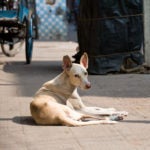
HYDERABAD—With the Holi festival around the corner on 9/10th March, festive spirits are high and many people are ready to revel in the burst of colours. Unfortunately, the rainbow of coloured powder or gulal that is traditionally used to celebrate Holi can pose a risk to our pets and street animals who can become stressed or frightened by being sprayed or rubbed with the dyed powder, and even suffer health consequences.
Alokparna Sengupta, Humane Society International/India’s interim executive director, says: “Holi festival celebrations can be a vibrant spectacle of colour for people, but a distressing ordeal for pets and street animals forcibly sprayed or rubbed with dyed powders. By respecting the animals around us and leaving them in peace, everyone participating in the Holi festival can have fun with fairness to our animal friends.”
HSI/India’s top tips to give animals a happy Holi!
Children and animals: Children are understandably excited at the sight of Holi colours and the splashing water. To avoid their excitement causing animals distress, use Holi as an opportunity to teach children about respect and kindness to animals. By taking the time to explain to children that dogs and other animals can easily be frightened, and discouraging the throwing of water balloons and paint, they can learn that their fun shouldn’t be unfair to animals. Street dogs are the most common victims of the toxic colours during the festival, so teach children that no animal, including street dogs, should be hurt during the festival.
As responsible animal guardians, we can also play our part by avoiding taking our dogs to places that are likely to be the focus of Holi activity. When dogs are afraid and anxious to escape, they may end up injuring themselves or those around them, so being fair with fun keeps everyone safe.
Walk your dog before celebrations begin: To avoid potentially stressful encounters, walk your dog early in the morning on the day of Holi before the festivities begin, and ensure your pets are kept safely indoors during the celebrations. Provide them with food, water, their favourite toy and a comfortable place to rest, so that they can retreat from the noise outside if they wish. This will also prevent children from startling or irritating them.
Don’t colour animals: Animals don’t enjoy being covered with coloured water or powder, and it has the potential to harm them. The colours typically used to play Holi are synthetic dyes containing ingredients that are potentially toxic and can lead to skin allergies and even blindness in humans and animals. The dry powder which is often mistakenly thought to be safe to be used on pets contains lead which can build up in the body as a poison. Inhaling the powder may cause nasal irritation, and even respiratory infection. Dogs and other animals also tend to lick their body to clean themselves, unwittingly ingesting the Holi colours and very often this becomes the chief source of poisoning.
Remove colours with mild shampoos: If your pet does become dyed with Holi colours, gently wash them with a mild dog/pet shampoo. Never use kerosene or spirits to remove colours or hard paints off your dog’s coat. If the dog has been hit in the face with a water balloon or colours have entered their eyes, nose or mouth and been ingested, carefully and thoroughly wash the affected areas with clean water, and take them to a veterinarian as soon as possible to get checked over.
Watch out for warning signs of poisoning: Symptoms of poisoning can include excessive salivation, vomiting, loose motions, and behavioural changes like aggression or stupor in your pet. If you observe any of these signs, take your pet to a veterinarian immediately. Bringing the suspected source of poisoning (colour) will help the vet take the most appropriate remedial action.
Sensitize your community: Request your community secretary and building managers to put up an advisory asking occupants to keep pets indoors during celebrations and not to throw water or colours at street animals.
Don’t feed sweets to your pets: Eating sweets and sugar can cause serious digestive illness in dogs and other animals, even resulting in seizures in some cases. Be vigilant around your companion animals to make sure your guests or children do not offer sweets to your pet. Similarly, fried or high-calorie foods can also cause animals digestive upset so make sure if you give your pet a Holi treat, it’s suitable for animals!
ENDS
Media contact: Shambhavi Tiwari, stiwari@hsi.org, +91-8879834125




